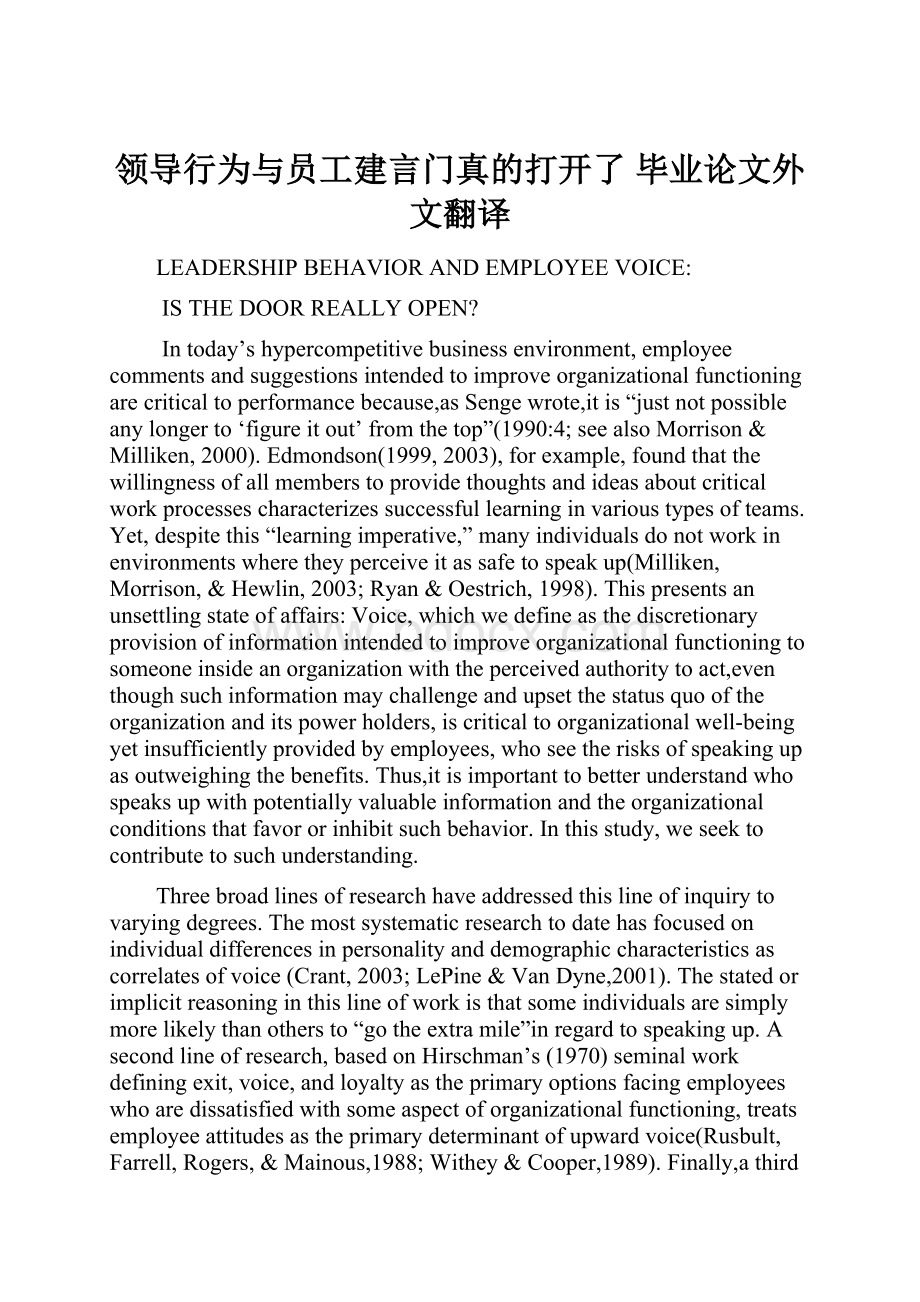领导行为与员工建言门真的打开了毕业论文外文翻译.docx
《领导行为与员工建言门真的打开了毕业论文外文翻译.docx》由会员分享,可在线阅读,更多相关《领导行为与员工建言门真的打开了毕业论文外文翻译.docx(16页珍藏版)》请在冰豆网上搜索。

领导行为与员工建言门真的打开了毕业论文外文翻译
LEADERSHIPBEHAVIORANDEMPLOYEEVOICE:
ISTHEDOORREALLYOPEN?
Intoday’shypercompetitivebusinessenvironment,employeecommentsandsuggestionsintendedtoimproveorganizationalfunctioningarecriticaltoperformancebecause,asSengewrote,itis“justnotpossibleanylongerto‘figureitout’fromthetop”(1990:
4;seealsoMorrison&Milliken,2000).Edmondson(1999,2003),forexample,foundthatthewillingnessofallmemberstoprovidethoughtsandideasaboutcriticalworkprocessescharacterizessuccessfullearninginvarioustypesofteams.Yet,despitethis“learningimperative,”manyindividualsdonotworkinenvironmentswheretheyperceiveitassafetospeakup(Milliken,Morrison,&Hewlin,2003;Ryan&Oestrich,1998).Thispresentsanunsettlingstateofaffairs:
Voice,whichwedefineasthediscretionaryprovisionofinformationintendedtoimproveorganizationalfunctioningtosomeoneinsideanorganizationwiththeperceivedauthoritytoact,eventhoughsuchinformationmaychallengeandupsetthestatusquooftheorganizationanditspowerholders,iscriticaltoorganizationalwell-beingyetinsufficientlyprovidedbyemployees,whoseetherisksofspeakingupasoutweighingthebenefits.Thus,itisimportanttobetterunderstandwhospeaksupwithpotentiallyvaluableinformationandtheorganizationalconditionsthatfavororinhibitsuchbehavior.Inthisstudy,weseektocontributetosuchunderstanding.
Threebroadlinesofresearchhaveaddressedthislineofinquirytovaryingdegrees.Themostsystematicresearchtodatehasfocusedonindividualdifferencesinpersonalityanddemographiccharacteristicsascorrelatesofvoice(Crant,2003;LePine&VanDyne,2001).Thestatedorimplicitreasoninginthislineofworkisthatsomeindividualsaresimplymorelikelythanothersto“gotheextramile”inregardtospeakingup.Asecondlineofresearch,basedonHirschman’s(1970)seminalworkdefiningexit,voice,andloyaltyastheprimaryoptionsfacingemployeeswhoaredissatisfiedwithsomeaspectoforganizationalfunctioning,treatsemployeeattitudesastheprimarydeterminantofupwardvoice(Rusbult,Farrell,Rogers,&Mainous,1988;Withey&Cooper,1989).Finally,athirdresearchstreamfocusesonaspectsofanorganizationalcontextthatmayaffectemployees’willingnesstospeakup.Animplicitassumptioninthisviewisthateventhemostproactiveorsatisfiedemployeesarelikelyto“readthewind”astowhetheritissafeand/orworthwhiletospeakupintheirparticularcontext(Dutton,Ashford,O’Neill,Hayes,&
Wierba,1997;Edmondson,2003;Millikenetal.,2003).
Seekingtofurtherdevelopthecontextualstream,wefocusontherolethatspecificleadershipbehaviorsplayininfluencingemployees’decisionstovoluntarilyprovidecommentsorsuggestionsintendedtosparkorganizationalimprovement.Qualitativeresearchhasidentifiedanumberofleaderbehaviorsorattributes—including“approachability”(Millikenetal.,2003;Saunders,Sheppard,Knight,&Roth,1992),“actiontaking”(Edmondson,2003;Ryan&Oestreich,1998),and“accessibility”(Edmondson,1999)—thatleadsubordinatestoconcludeitiseithersafeorunsafetospeakup.However,thefewquantitativestudiesthathaveassessedsomeaspectofleadershipinfluenceonvoicehaveproducedlessconclusiveresults(e.g.,Ashfordetal.,1998).Forexample,Saundersandcolleagues(1992)developedameasure,“supervisorasvoicemanager,”andfoundittobepositivelyrelatedtothelikelihoodofvoiceintwosamples,butJanssen,deVries,andCozijnsen(1998),controllingforseveralindividualdifferences,foundthatthesupervisorasvoicemanagerconstructwasnotsignificantlyrelatedtosubordinates’reportedlikelihoodtovoicenovelideas.Insum,theliteraturepresentsatroublingdiscrepancy:
Studieswiththehighestfacevaliditysuggestthatleadershipbehaviorsareanimportantcontextualantecedentofvoice,butsurveyresearchhasfailedtoreplicatesuchfindings.
Thespecificpurposeofthisstudywasthereforetoaddressinconsistentfindingsaboutleadershipbehaviorasaninfluenceonsubordinates’improvement-orientedvoice.Inatwo-phasefieldstudy,weaddressedthequestions,“Isleadershipbehaviorrelatedtosubordinatevoice?
”and,“Ifso,whyandforwhattypesofemployees?
”Ourstudyextendstheliteratureinanumberofways.First,fewofthelabelsusedtodescribeleadershipfindingsinpreviousworkcorresponddirectlywithconstructsdevelopedinthebroaderleadershipliterature.Wedrewuponwell-establishedtheoryonleadershipandpowertodeveloppredictionsforhowspecificleaderbehaviorsinfluenceemployeevoice.Second,wecontrolledformanyofthepersonalityandemployeeattitudinalexplanationsfoundimportantinpriorvoiceresearchbutusuallylackingintheleadership-focusedstudies.Third,weheededcallsformoreprecisioninvoiceresearch(VanDyne,Ang,&Botero,2003)bylimitingourvoiceconstructtoverbalbehaviorthatisimprovement-orientedanddirectedtoaspecifictargetwhoholdspowerinsidetheorganizationinquestion.Beyondadvancingunderstandingofleadershipbehaviorasapredictorofvoice,thisstudyalsoexaminespsychologicalsafetyasanimportantmediatingcognitionlinkingleadershipandvoiceand
addresseshowsubordinateperformancelevelmightmoderatetheimpactofleadershipbehavioronvoice.Collectively,thisresearchextendsunderstandingoftheleadership-voicerelationshipandpointstospecificwaysleaderscanfosteremployeeinput.
LITERATUREREVIEWANDHYPOTHESES
Thenotionofvoicestemsfromtheideathatemployeesrecognizesomesourceofdissatisfactionoropportunityforimprovingtheirownand/ortheirorganization’swell-being(Hirschman,1970).Speakingupinsuchsituationscanfeelriskybecausetheyinvolvepointingoutneedforimprovementinaprogramorpolicytothosewhomayhavedevised,beresponsiblefor,orfeelpersonallyattachedtothestatusquo.Giventhis,alongwiththerealitythatvoicecannotbecoercedorreadilydesignedintothein-rolerequirementsofajob(VanDyne&LePine,1998),aninitialmotivationtopeakupislikelytomanifestinbehavioronlywhenthenetperceivedbenefitsoutweighpotentialcosts.Perceivedpotentialbenefitsofspeakingupincludegettingtheproblemsolvedaswellasformal(e.g.,moneyorpromotion)orinformal(e.g.,recognitionorstatus)rewardsthatmightbeassociatedwithhavingone’sideasbewellreceivedandpossiblyimplemented.Conversely,potentialcostsinclude“existencelosses”(e.g.,demotionortermination)and“relatednesslosses”(e.g.,humiliationorlossofsocialstanding)(Maslow,1943).Inshort,thedecisiontospeakupresultsfromanaffectladenexpectancy-likecalculus(Ashford,Rothbard,Piderit,&Dutton,1998;Millikenetal.,2003;Withey&Cooper,1989).
Theoretically,leadershipbehavioraffectsthisvoicecalculusfortwoprimaryreasons,bothrelatedtotheresourcedependencyofsubordinatesinhierarchicalsettings(Emerson,1962;Pfeffer&Salancik,1978).First,tospeakup,bydefinition,involvessharingone’sideaswithsomeonewiththeperceivedpowertodevoteorganizationalattentionorresourcestotheissueraised(French&Raven,1959).Thus,leadersareinherentlyimportanttothevoiceprocessbecausetheyareitstargets.Second,leadershavetheauthoritytoadministerrewardsandpunishments,andthispoweroversubordinates’pay,promotions,andjobassignmentsmakesleaders’actionshighlysalientascuesforbehavior(Depret&Fiske,1993).Thus,whenleaderssendsignalsthattheyareinterestedinandwillingtoactonsubordinatevoice,subordinates’motivationtospeakupshouldbemaintainedorenhanced;absentsuchleaderbehaviors,subordinatesmayseepotentialrisksasoutweighingperceivedbenefits.
Change-OrientedLeadership
Becausevoiceinvolvessuggestionstodosomethingdifferently,leaderbehaviorssignalinganopennesstoorappreciationforchangeshouldbeacriticalcontextualinfluenceonemployeewillingnesstospeakup.Descriptionsfromqualitativeresearchsuggesttheimportanceofsuchbehaviors.Forexample,Edmondson(2003)reportedthatleaderswhoexplicitlycommunicatedarationaleforchange,explainedtheneedforothers’input,andtookactiononothers’ideashadsubordinateswhoweremorewillingtocontributetoteamlearningdespitetheinherentrisksofspeakingup.Here,wehypothesizethattwospecificsetsofperceivedleaderbehaviors—managementopennessandtransformationalleadership—areparticularlyindicativeofanorientationtowardcontinuousimprovementandshouldthereforebepositivelyrelatedtosubordinates’beliefthatitissafetospeakupandwillingnesstodoso.
Researchonissueselling(voiceregardingaspecificworkimprovementoremployeetreatmenttopic)hasidentifiedmanagementopennessasasetofleaderbehaviorsparticularlyrelevanttosubordinates’motivationtospeakup(Ashfordetal.,1998).Managerialopennessreferstosubordinates’perceptionsthattheirbosslistenstothem,isinterestedintheirideas,givesfairconsiderationtotheideaspresented,andatleastsometimestakesactiontoaddressthematterraised.Suchbehaviorsaresignificantinmaintaininginitialmotivationtospeakup(Millikenetal.,2003).Moreimportantly,behaviorsindicatingopennesstoemployeeinputmaydecreasethesalienceofthepowerdifferentialbetweenleadersandsubordinatesinsuchawaythatemployeesperceivefewcostsfromraisingpotentiallyriskyideas(Edmondson,2003).
LikeHouseandRizzo’s(1972)topmanagementreceptivenessconcept,opennessasrelatedtoissuesellinghasbeenconceivedofprimarilyasaseniormanagerbehavior.However,man